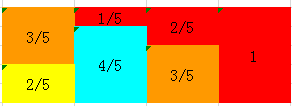举个例子,游戏中玩家推倒了一个boss,会按如下概率掉落物品:10%掉武器 20%掉饰品 30%掉戒指 40%掉披风。现在要给出下一个掉落的物品类型,或者说一个掉落的随机序列,要求符合上述概率。
一般人会想到的两种解法
第一种算法,构造一个容量为100(或其他)的数组,将其中10个元素填充为类型1(武器),20个元素填充为类型2(饰品)...构造完毕之后,在1到100之间取随机数rand,取到的array[rand]对应的值,即为随机到的类型。这种方法优点是实现简单,构造完成之后生成随机类型的时间复杂度就是O(1),缺点是精度不够高,占用空间大,尤其是在类型很多的时候。
第二种就是一般的离散算法,通过概率分布构造几个点,[10, 30, 60, 100],没错,后面的值就是前面依次累加的概率之和(是不是像斐波那契数列)。在生成1~100的随机数,看它落在哪个区间,比如50在[30,60]之间,就是类型3。在查找时,可以采用线性查找,或效率更高的二分查找,时间复杂度O(logN)。
下面是第二种算法使用二分查找的实现:
<?php class DiscreteSample { private $cdf; private $cnt; public function init($pdf) { $this->cnt = count($pdf); if($this->cnt == 0) die("pdf size is empty"); if(abs(array_sum($pdf) - 1) > 0.00001) die("pdf sum not equal 1, sum:".array_sum($pdf)); $this->_pdf2cdf($pdf); } private function _pdf2cdf($pdf) { $this->cdf = $pdf; for ($i=1; $i < $this->cnt; $i++) { $this->cdf[$i] += $this->cdf[$i - 1]; } //因为浮点型精度问题,最后一个值强制为1 $this->cdf[$this->cnt - 1] = 1; } public function next_rand() { $left = 0; $right = $this->cnt; $random = mt_rand() / mt_getrandmax(); while ($left < $right - 1) { $mid = intval(($left + $right)/2); if($mid - 1 >= $this->cnt) break; if($random > $this->cdf[$mid - 1]) $left = $mid; else $right = $mid; } return $left; } } ?>
Alias Method(别名方法)
别名算法最终的结果是要构造拼装出一个每一列合都为1的矩形,若每一列最后都要为1,那么要将所有元素都乘以4(概率类型的数量)

此时会有概率大于1的和小于1的,接下来就是构造出某种算法用大于1的补足小于1的,使每种概率最后都为1,注意,这里要遵循一个限制:每列至多是两种概率的组合。

最终,我们得到了两个数组,一个是在下面原始的prob数组[0.4,0.8,0.6,1],另外就是在上面补充的Alias数组,其值代表填充的那一列的序号索引,(如果这一列上不需填充,那么就是NULL),[3,4,4,NULL]。当然,最终的结果可能不止一种,你也可能得到其他结果。
等等,这个问题还没有解决,得到这两个数组之后,随机取其中的一列,比如是第三列,让prob[3]的值与一个随机小数f比较,如果f小于prob[3],那么结果就是3,否则就是Alias[3],即4。
我们可以来简单验证一下,比如随机到第三列的概率是1/4,得到第三列下半部分的概率为1/4*3/5,记得在第一列还有它的一部分,那里的概率为1/4*(1-2/5),两者相加最终的结果还是3/10,符合原来的pdf概率。这种算法初始化较复杂,但生成随机结果的时间复杂度为O(1),是一种性能非常好的算法。

代码示例
<?php class AliasMethod { private $length; private $prob_arr; private $alias; public function __construct ($pdf) { $this->length = 0; $this->prob_arr = $this->alias = array(); $this->_init($pdf); } private function _init($pdf) { $this->length = count($pdf); if($this->length == 0) die("pdf is empty"); if(array_sum($pdf) != 1.0) die("pdf sum not equal 1, sum:".array_sum($pdf)); $small = $large = array(); for ($i=0; $i < $this->length; $i++) { $pdf[$i] *= $this->length; if($pdf[$i] < 1.0) $small[] = $i; else $large[] = $i; } while (count($small) != 0 && count($large) != 0) { $s_index = array_shift($small); $l_index = array_shift($large); $this->prob_arr[$s_index] = $pdf[$s_index]; $this->alias[$s_index] = $l_index; $pdf[$l_index] -= 1.0 - $pdf[$s_index]; if($pdf[$l_index] < 1.0) $small[] = $l_index; else $large[] = $l_index; } while(!empty($small)) $this->prob_arr[array_shift($small)] = 1.0; while (!empty($large)) $this->prob_arr[array_shift($large)] = 1.0; } public function next_rand() { $column = mt_rand(0, $this->length - 1); return mt_rand() / mt_getrandmax() < $this->prob_arr[$column] ? $column : $this->alias[$column]; } } ?>